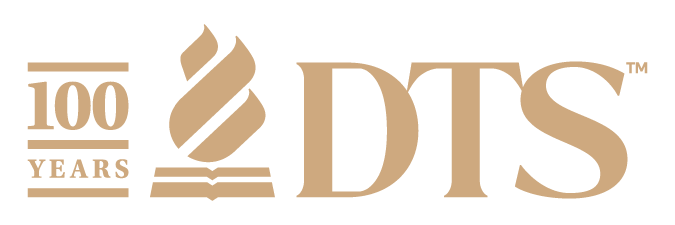Degree Overview
| Total Hours | 36 credit hours |
| Degree Time Limit | 6 years from first DTS class |
| Real-time courses | 0 courses required (Fully Online degree) |
| Satisfactory Academic Progress (SAP) | 6 hours per academic year |
Priorities
- Refer to the degree plan for your entering catalog as an overall guide.
- Register for core courses: BE5101, ST5101, and PM5101.
- Familiarize yourself with the Academic Success Resource Center for various tools and links to assist with your courses.
- Meet with an academic advisor to discuss:
- What led you to DTS
- What elective courses might be helpful to take
- The possibility of taking a hybrid and/or intensive in upcoming semesters at a DTS location
What courses can I take for my Theological Studies electives?
Students may take Historical Theology (HT) or Systematic Theology (ST) courses to complete the 6 hours of Theological Studies electives. If students anticipate changing to a different DTS degree, then students should take core ST courses (5101-5105), since these are required in the other Master’s degrees.
Students in the 2021 MBTS catalog select either HT5101 Church to the Modern Era or HT5200 History of Doctrine. Students have 3 hours of Theological Studies electives remaining from ST or HT courses.
ST101/5101 Theological Method and Bibliology is the prerequisite for most ST courses. The one exception is ST5106 Eschatology, which requires ST5101-5105 as a pre or co-requisites due to the final/capstone doctrinal statement required in ST5106.
How do I select open electives?
- What areas of knowledge do you wish to acquire?
- What ministry skills do you need to develop or sharpen?
- The DTS course schedule page will provide you with a list of courses available.
- Academic advisors are available to help you identify possible electives specifically geared to equip you in your present and future ministry.
What is RS5103 Summative Research Project? (Required before the 2021 catalog)
This is a capstone writing project students should take in their final year or ideally in their final semester. The Advising Center created a document “Seven Things to Know about RS5103” to best help students prepare for this course.
What is required for Graduation?
- Students must submit the Graduation Application on their student portal along with the church letter and personal reference by the deadlines listed for each semester on the Graduation Information page.
- Confirm the Graduation Date listed in the system corresponds to your plan with your Academic Advisor and/or Registrar’s Office.
- Review/Confirm upcoming semester plans with an academic advisor to ensure all degree requirements are met.
Resources
The following are degree plans specific to students who entered the MBTS or reclassified to the MBTS in the following academic years. If students have questions about their specific degree requirements or degree audit, students should contact their academic advisor.
Master’s level students keep their current Logos Bible Software package. Future Logos updates or upgrades are the responsibility of each person and not done through DTS.
DTS graduates have three options for further training:
- Self-paced learning through Online Videos – All online courses and lectures are available for graduates to access through the Alumni portal. No application is required.
- Alumni nondegree – Graduates may take additional DTS courses as a nondegree student, either for audit or credit at a reduced rate. If students take courses for Alumni nondegree credit and want to use the course(s) toward another master’s degree, then the student will need to pay the difference of tuition between the Alumni rate and current tuition rate.
- Pursue an additional DTS degree – Graduates may return to DTS to pursue a second master’s degree or a doctoral degree. Graduates must reapply through Admissions and previous DTS credits are reevaluated and remaining requirements are evaluated upon readmission. Doctoral degrees may require additional master’s level work.




